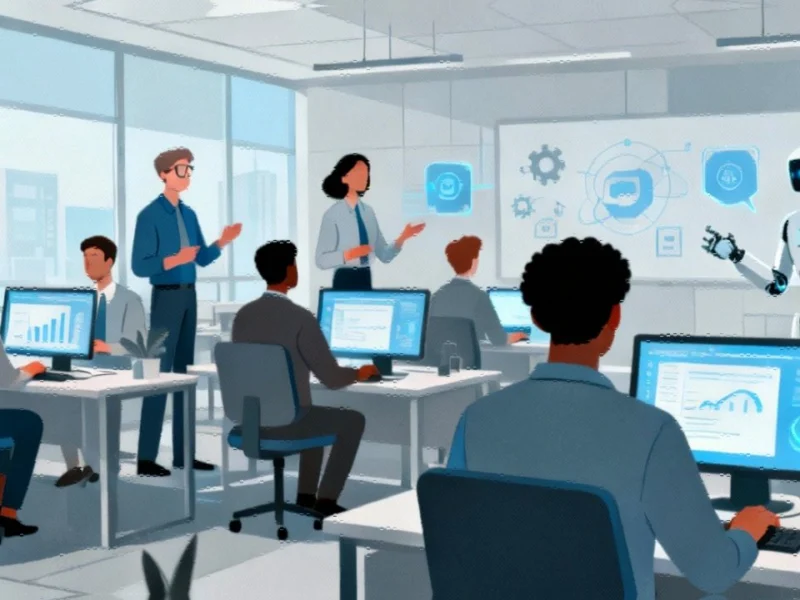The Changing Digital Ecosystem
Wikipedia, long celebrated as one of the internet’s most reliable knowledge repositories, is experiencing a notable shift in user engagement patterns. According to recent data from the Wikimedia Foundation, human pageviews on the encyclopedia have declined by 8% year-over-year. This trend emerges as generative AI and social video platforms increasingly alter how people access and consume information.
Marshall Miller of the Wikimedia Foundation detailed these findings in a comprehensive blog post, noting that the decline became particularly evident after improvements to Wikipedia’s bot detection systems. These updates revealed that “much of the unusually high traffic for the period of May and June was coming from bots that were built to evade detection,” suggesting the actual human traffic decline may be more significant than initially apparent.
AI Search Summaries and Their Impact
The primary driver behind this traffic reduction appears to be the growing prevalence of AI-powered search engines that provide direct answers to queries rather than directing users to source websites. As Miller explained, “search engines are increasingly using generative AI to provide answers directly to searchers rather than linking to sites like ours.” This fundamental shift in how people access information online represents a significant challenge for traditional knowledge platforms.
While Google has disputed claims that AI summaries reduce traffic from search, the trend appears consistent with broader market dynamics affecting content consumption across multiple sectors. The convenience of instant answers comes at the potential cost of reduced engagement with primary sources.
The Social Video Factor
Younger generations are increasingly turning to social video platforms for information rather than traditional websites. This behavioral shift represents another challenge for Wikipedia’s traffic metrics. As Miller noted, “younger generations are seeking information on social video platforms rather than the open web.”
This transition parallels other technological transformations across industries, where new platforms rapidly reshape established consumption patterns. The move toward visual and algorithmically-curated content represents a significant departure from Wikipedia’s text-based, user-curated model.
Wikipedia’s Response and Adaptation
The Wikimedia Foundation has taken a nuanced approach to these challenges. While expressing concern about declining direct traffic, the organization acknowledges that knowledge sourced from Wikipedia still reaches people through these new channels. The foundation has even experimented with AI summaries of its own content, though it paused these efforts after editor feedback.
Wikipedia is developing a new framework for attributing content from the encyclopedia and has established two teams specifically tasked with helping the platform reach new readers. These initiatives reflect the organization’s commitment to adapting to evolving technology trends while maintaining its core mission.
Broader Implications for Knowledge Ecosystems
The traffic decline raises important questions about the sustainability of volunteer-driven knowledge projects. As Miller emphasized, “With fewer visits to Wikipedia, fewer volunteers may grow and enrich the content, and fewer individual donors may support this work.” This potential reduction in both contributors and funding could ultimately impact the quality and breadth of the knowledge base itself.
The situation highlights the complex interplay between strategic responses to technological change and the preservation of valuable digital resources. It also underscores the importance of recognizing the human effort behind knowledge creation, particularly as AI systems increasingly rely on human-curated content for training.
Call to Action for Digital Citizens
Miller encourages internet users to actively support content integrity and creation. “When you search for information online, look for citations and click through to the original source material,” he advises. This simple practice helps maintain the visibility and sustainability of primary knowledge sources.
Additionally, he suggests discussing “the importance of trusted, human curated knowledge” within personal networks and helping others understand that “the content underlying generative AI was created by real people who deserve their support.” This educational component becomes increasingly crucial as scientific and technical knowledge becomes more accessible through AI interfaces.
The Wikimedia Foundation’s findings serve as both a warning and an opportunity—a chance to reconsider how we value and support the human-curated knowledge infrastructure that underpins much of our digital ecosystem. As AI and social platforms continue to evolve, maintaining this balance will be essential for preserving the internet’s knowledge commons.
This article aggregates information from publicly available sources. All trademarks and copyrights belong to their respective owners.
Note: Featured image is for illustrative purposes only and does not represent any specific product, service, or entity mentioned in this article.



